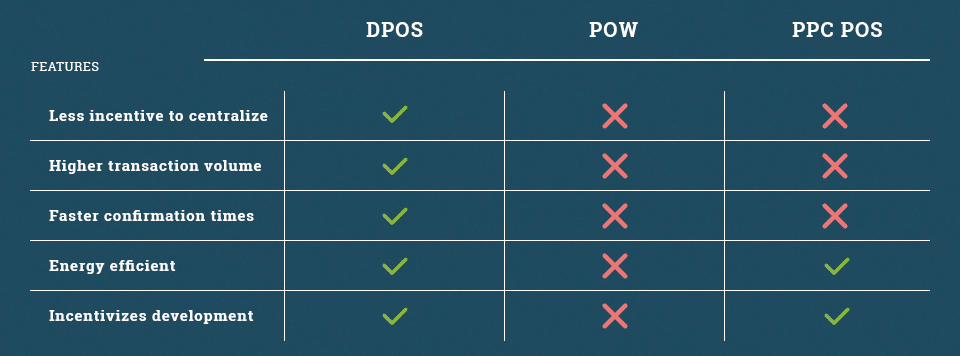
Every blockchain has it’s own consensus mechanism protocol. These protocols are used in order to validate the transactions in the blockchain network. For example, we have Proof-Of-Work (PoW) as a consensus mechanism in the case of Bitcoin Blockchain. Similarly, we have another consensus protocol named Proof-Of-Stake (PoS)used by various other blockchain. But both of these consensus mechanisms have their own pro’s and cons. New blockchains are coming with more advanced consensus protocols. One of them is Delegated Proof Of Stake (DPoS).
Delegated Proof Of Stake (DPoS) is an advancement to current PoS protocol. In the original Proof-of-Stake consensus mechanism, a crypto user can stake his/her cryptocoins to the respective blockchain network, thereby earning the right to verify transactions, forge blocks, and earn associated rewards.
As mentioned above, DPoS is an advancement to PoS by having all the features of PoS along with some additional features. DPoS is like a digital democracy which leverages the power of stakeholder to resolve any consensus issued by voting in a fair and democratic way.
Delegated Proof of Stake is the brainchild of Dan Larimer, the creator of Bitshares. Bitshares was established in 2014 and has a fairly active community. Dan realised the possibility of centralization in Bitcoin mining and the potential environmental impact of Proof of Work. Dan believes that DPoS has the following benefits over traditional PoW and PoS systems:

Delegated proof of stake uses real-time voting combined with a social system of reputation to achieve consensus in the blockchain network. DPoS is the least centralized consensus protocol compared to all others. Every token holder in the DPoS consensus blockchain network can exercise a degree of influence about what happens on the network.
DPoS seeks to achieve consensus fast and more efficiently than original PoS. It has been discussed below
The functioning of Delegated Proof Of Stake (DPoS) has been explained and breaked down to following stages:-
In Delegated Proof Of Stake (DPoS) consensus protocol, the users have to ‘vote’ to select ‘witnesses’ (who are other users that they trust to validate transactions). The witnesses who have got the most votes, earns the right to validate and verify the transactions in the blockchain network. The Users can even delegate their voting power to other users, whom they trust to vote for witnesses on their behalf.
Votes are weighed according to the size of each voter’s stake of the crypto coins. A user which does not have a large stake can even enter the top tier of witnesses.
But, votes from users with large stakes can result in users with relatively small stakes being elevated to the top tier of witnesses as votes are weighed according to size of stake.
Voting is a continuous process and each witness in the top tier is always at risk of being replaced by a user who gets more votes and is therefore considered more trusted. As a blockchain grows, it becomes increasingly competitive to become or remain a witness in the top tier. Users can also vote to remove a witness in the top tier who has lost their trust.
Each blockchain has their own set of rules. Generally, the number of witnesses in the top tier is capped at a certain number (discussed below, keep reading). These witnesses are responsible for validating and verifying the transactions, creating blocks, and are in return rewarded with crypto coins as fees.
“Witness” in DPoS is similar to “Miner” in PoW. The witnesses that are elected in the top tier can prevent specific transactions from being included in an upcoming block but they cannot change the details of any transaction. But,a as DPoS is a democratic protocol, any witness performing malicious behaviour can be removed. Also, as voting is a continuous process in DPoS network, bad reputation will affect in the witness election. De-throned from the position of witness will result in loss of income and thus, all witnesses will usually act in their best behaviour. This is how, DPoS becomes democratic
Delegates are the trusted parties responsible for maintaining the network. The delegates looks after the governance and performance of the entire blockchain protocol, but do not play a role in transaction validation and block production. For example, the delegates can propose changing the size of a block, or the amount a witness should be paid in return for validating a block. Once the delegates propose such changes, the blockchain’s users vote on whether to adopt them.These delegates are also elected by users through voting.
In some DPoS versions, a delegate needs to show commitment by depositing his funds into a time-locked security account (which is confiscated in case of malicious behavior). This version of DPoS is often referred to as deposit-based proof of stake.
To summarise the roles of delegates are:-
Following are some blockchain networks that are current using Delegated Proof Of Stake (DPoS) Consensus mechanism:-
As mentioned above that each DPoS has it’s own numbers of block producers, following are the numbers for some of the more well-known DPoS chains:
Following are the advantages of Delegated Proof Of Stake (DPoS) consensus protocol:-
Following are the disadvantages of Delegated Proof Of Stake (DPoS) consensus protocol:-
Vitalik Buterin, the Co-Founder of the Ethereum project claims that DPoS creates incentives for “https://vitalik.ca/general/2018/03/28/plutocracy.html” rel=”nofollow”>witnesses to form cartels and bribe voters for support.
DPoS is the next big thing in the evolution of consensus mechanism protocols.Delegated Proof of Stake consensus focuses its efforts on improving scalability while sacrificing some elements of decentralization.
Which method will rise to the top? Will it be PoW or PoS or DPoS or any other? Let us know in the comments section below
KryptoMoney publishes latest crypto news, latest bitcoin news, blockchain updates, articles and reviews about upcoming ICO’s. Join our telegram channel to stay updated.
Keep in mind that we may receive commissions when you click our links and make purchases. However, this does not impact our reviews and comparisons. We try our best to keep things fair and balanced, in order to help you make the best choice for you.